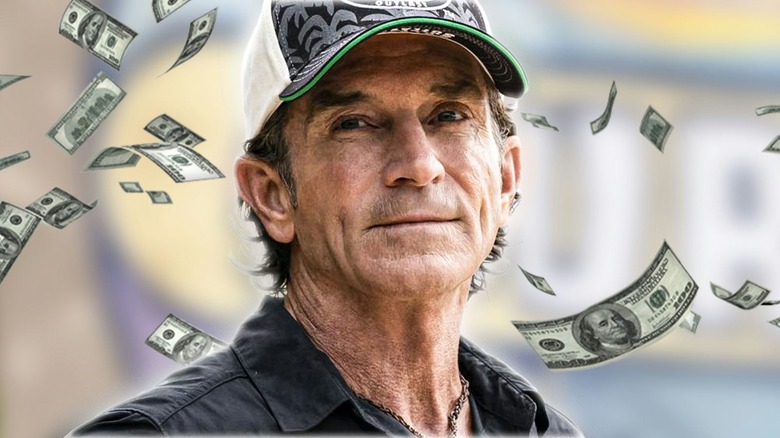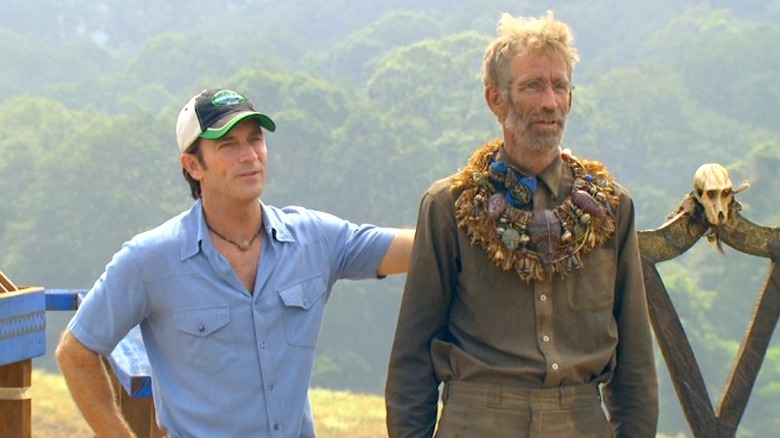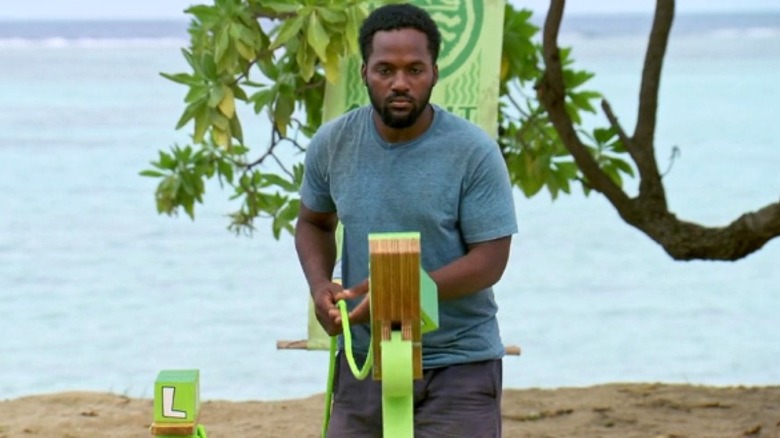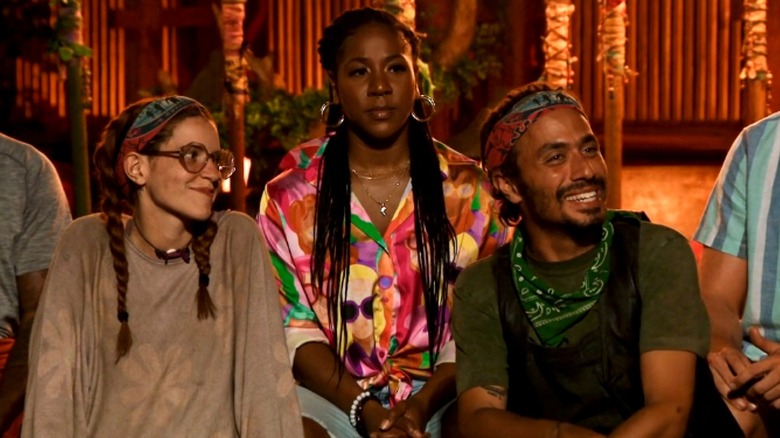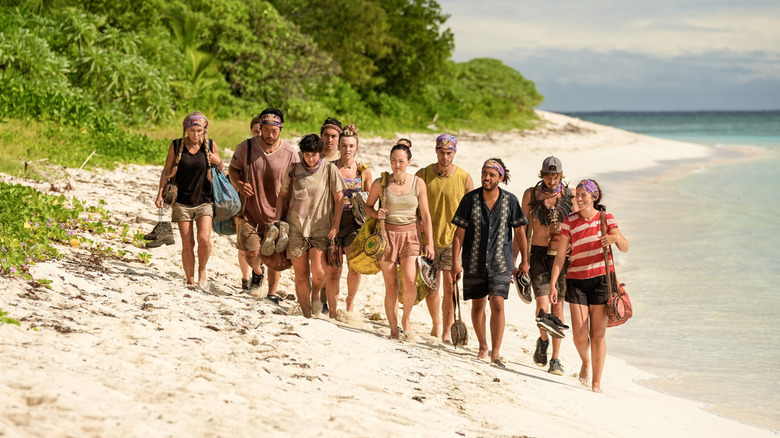Do Survivor Contestants Get Paid?
Physical strength, problem-solving skills, social strategy, and overall agility — all of these are put to the test on "Survivor." The long-running competition show has been tasking castaways with its unique endurance test for more than 40 seasons. The CBS hit captivates audiences with heart-pounding games and contestants that have become fan favorites, including those who rank among Looper's list of best "Survivor" contestants.
While nature plays a big role in the series, it's the contestants that truly make the competition worth watching. Boston Rob, Richard Hatch, and Amanda Kimmel are just some of the players who have left fans on the edge of their seats. It's a tough game that requires a lot of work; so tough that even host Jeff Probst almost died while performing a stunt for the show.
So do these contestants get paid? The short answer is yes — but the amount they earn really depends on how far they make it in the season and if they're ultimately declared the Sole Survivor.
First place on Survivor wins $1 million
After 26 days of competition and navigating alliances, it's finally time for the jury to decide who will be named the Sole Survivor. While winning the top prize gives the winner major bragging rights, it also gives them a $1 million check — unless we're discussing Season 40, "Survivor: Winners at War," which rewarded the winner with $2 million. Either way, it's the grand prize that Jeff Probst constantly reminds the contestants about as they spend weeks far away from home.
Bear in mind, that prize money is taxed. In 2016, the net amount was estimated at $580,000; that's still life-changing money, of course, and some winners have used it to splurge a little. Chris Daugherty, the winner of Season 9's "Survivor: Vanuatu," appeared on a "Survivor Millionaires: Where Are They Now" special on TV Guide Network and said that the first thing he did was buy a Harley. "It is something I've probably wanted since I was 16 or 17. I was never financially secure enough to do so, so that was my first purchase," he said, adding that he also built a new home with his winnings.
Meanwhile, the winner of Season 17, "Survivor: Gabon," chose to start a business with his family. Bob Crowley started a glamping retreat in Portland, Maine. His company, Maine Forest Yurts, offers vacationers a tranquil oasis on 100 acres of land.
Second place on Survivor wins $100,000
While everyone is vying for that $1 million prize, the second place award isn't too shabby; those in the runner-up position receive $100,000. Dreamz Herd, who took the second spot during Season 14, "Survivor: Fiji," used his winnings to buy six cars, take a trip to Disney World, and go on a cruise.
Other second-place contestants have also reflected on their winnings, and they've found that the experience on the show is priceless in and of itself. Deshawn Radden took the runner-up spot during Season 41, "Survivor: A New Era," earning just one vote while winner Erika Casupanan received the other seven. Radden talked to Entertainment Weekly about his very emotional experience on the show, saying that he enjoyed receiving the second-place prize money, though it wasn't the only thing that he gained. "I think beyond the money, it was such an honor to play the game because of how much I got to learn about my actual personality and to better myself in the future," he said.
Katie Gallagher, who came in second place during Season 10, "Survivor: Palau," shared similar sentiments regarding her experience. As she told Entertainment Weekly, "Even though the game is about winning money, I won so much more than that. My experience on 'Survivor' led me to so many beautiful humans that I love so dearly and hold in my heart forever."
Third place on Survivor wins $85,000
First and second place are ideal positions to be in on "Survivor," but third place also receives a sizable payout. According to Rafe Judkins, who competed during Season 11, "Survivor: Guatemala– The Maya Empire," third place takes home $85,000. It's a payday that goes all the way back to Season 1 when Rudy Boesch took home the same amount.
While it would be nice to win the $1 million top prize, taking home the payday of a third-place contestant isn't too bad. However, Judkins has had some issues with the way in which the winner has been determined in recent seasons, including the final four's fire-making challenge introduced during Season 35, "Survivor: Heroes vs. Healers vs. Hustlers." Under the revised rules, the last immunity challenge winner gets to choose a member of the final three. The other two castaways in the final four then compete to see who can start a fire the fastest, thus deciding who is sent to the jury. "There was a certain purity to have to vote out a group of people who you then had to convince to vote for you," Rafe said in an interview with Entertainment Weekly.
Meanwhile, series creator Jeff Probst also spoke with EW about the change, claiming that it actually solved a problem with the contest. "If someone plays a great game and gets to the final four, it has always bothered me that the other three can simply say, 'We can't beat him, so let's just all vote him out,'" he said, defending the rule adjustment.
Survivor contestants get paid for the reunion
While the season finale of "Survivor" can be a nail-biter as each jury vote slowly reveals the Sole Survivor, the end-of-season reunion is usually just as exciting. From sharing hot takes on the winner of the season and who went home too early to discussing the behind-the-scenes action that viewers never got to see, the reunion is a full-on rehashing of what exactly went down between the castaways and how their strategies either worked or failed. In exchange for discussing all of these details, each contestant is handsomely compensated for their time.
Each person who takes a seat on the reunion show stage receives $10,000. Prior to Covid-19, appearing on the special episode meant that the contestants were participating in a live reveal of the winner in addition to participating in a tell-all about the previous season. Like many shows, "Survivor" made changes due to the pandemic, including how long the actual season runs. As for the reunion and finale, the pandemic led to the series turning this into a pre-taped episode. However, the "Survivor" Season 47 finale will give fans another change by expanding the finale by splitting it into two two-hour episodes instead of the usual three-hour, single-episode finale.
Do contestants get paid just for appearing?
While every castaway who steps on the island has the goal of reaching the finale, only a few will make it far enough to compete in the final challenge – but that doesn't mean that those who leave early won't see a payday. The first castaway who is sent packing during their season receives $2,500. Basically, the longer someone stays on the island, the bigger their payout is. For example, Jenna Lewis was the ninth person to be voted off of Season 1, "Survivor: Borneo," and she received $27,500. for her efforts
It is important to point out that while these numbers are standard for many seasons of "Survivor," Season 40, "Winners at War," increased the contestants' base payout by starting the appearance rate at $25,000. "Survivor All-Stars" also had the same minimum for castaways. But whether it's $2,500 or $25,000, the compensation is a nice incentive for these contestants who are taking time off from work and leaving their families for what could be several weeks. No matter when their journey on the island ends, they know they have a check that's headed to the bank.
